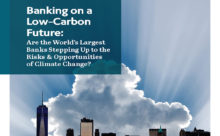A new report by Boston Common Asset Management, Banking on a Low-Carbon Future, which examines climate management by 59 of the world’s largest banks has found urgent shortcomings that threaten to undermine efforts to support the transition to a low-carbon economy. Despite progress in some areas and several examples of individual best practice, the sector is failing to capture the risks and opportunities of climate change. The report supports the engagement letter – backed by over 100 investors with almost $2 trillion in assets under management – sent to over 60 banks last September asking about alignment with TCFD.
The investors call on banks to take four actions:
- Disclose their climate risk in line with TCFD recommendations
- Publish a company-wide, forward-looking strategy aligned with the Paris Agreement
- Set clear targets to increase and promote low-carbon products or services
- Disclose public policy positions related to climate change, and to influence their trade associations to take progressive positions on climate legislation.
Report Highlights:
- Our $2 trillion investor group engaged with 59 of world’s largest banks. The report criticizes banking sector’s “skin deep” attempts to capture climate risks and opportunities.
- 54% of banks support the Taskforce on Climate-related Financial Disclosures (TCFD), but pace of alignment is too slow.
- Less than half (49%) of banks are implementing climate risk assessments or 2ºC scenario analysis, which means decision-making on portfolio shifts is not supported by robust data.
- Despite widespread disclosure of their low carbon products and services, only 46% of banks set explicit targets to promote such products/services.
- A majority of banks (61%) have failed to restrict the financing of coal – the most carbon intensive energy source. And the global banking sector provided $600 billion in financing for the top 120 coal plant developers between 2014 and September 2017.
- Only two in five banks (41%) ensure the trade associations or industry groups they are members adopt progressive climate policies.
The report however does commend the sector for some high-level advances including:
- Almost all are involved in industry or multi-stakeholder groups to advance knowledge-sharing and collaboration around climate risks and solutions
- 95% have adopted some degree of governance for climate issues internally; and 95% provide some disclosure on low-carbon products and services.
- Explicit exclusions for the financing of the most intensive high-carbon sectors (such as tar sands) are becoming an industry norm – 71% have adopted public exclusion policies linked to such carbon-intensive practices.
This report, which is the latest in a series of analyses undertaken since 2014, examines the progress of 59 of the world’s largest banks in making this critical business shift. This year we worked with regional partners ShareAction (UK), whose research on 15 European banks supported our analysis, SHARE (Canada), and Australian Ethical Investment (Australia). The report finds some wide regional differences between banks around the world. For example, 80% of European banks have undertaken climate-risk assessments, compared with an average of 33% of banks in each of the North America, Developed Asia and emerging market regions.




